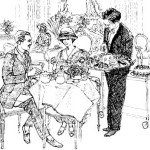Manners 101, or why McDonalds is amazing
Written by admin, Saturday, December 6th, 2008 in Culture, Manners Being in line to get a drink for McDonalds at rush hour (a time and a place one would not ever recommend for one’s time management/sanity/health), I realized something. Looking around at all the disgruntled employees working their rears off for close to minimum wage, I realized that there was something beautiful about the operation- that everything was organized so well that, about two seconds after I ordered a Diet Coke, a little machine picked it up, filled it with soda, placed it right next to an employee, and that employee immediately slapped a lid on it and handed it to me. Time elapsed: 0:10.
Being in line to get a drink for McDonalds at rush hour (a time and a place one would not ever recommend for one’s time management/sanity/health), I realized something. Looking around at all the disgruntled employees working their rears off for close to minimum wage, I realized that there was something beautiful about the operation- that everything was organized so well that, about two seconds after I ordered a Diet Coke, a little machine picked it up, filled it with soda, placed it right next to an employee, and that employee immediately slapped a lid on it and handed it to me. Time elapsed: 0:10.
There’s something incredibly interesting about that. McDonalds has the art of effortless quality down- that is to say, despite the disgusting nature of their food, they are so ridiculously efficient that they can pump out virtually anything you ask for- a drink, a burger, fries, that sort of thing- in seconds. While the employees are working their rears off for piss poor wages, it doesn’t feel like that for the consumer- like one of those clever little Rube Goldberg machines, all I have to do is say “Soda” and it comes to me through some intricate process I don’t have to understand. This isn’t just McDonalds, of course- plenty of companies exist like this- from Amazon.com to Zappos to Netflix to even Starbucks. They all “get it”- the idea of corporate efficiency, insane perfection to the point where the “down time” between a request and fulfillment is so small that it’s almost meaningless.
What does this have to do with manners? Everything.
First off, allow me to explain the truth about manners. Manners are, for all intents and purposes, a way in which to divide society with (very arbitrary) standards that allow people to classify proper and improper behavior. Fundamentally, it does not matter if the actions are very logical or not- some are, some are not- but the entire purpose of these rules (generally codified by word of mouth, or more “recently”, by the genius of Emily Post and Judith Martin). These rules, developed through a long history of trial-and-error and flecked with different standards based on different periods of society, provide a kind of rubric for everyone to judge everyone else.
That sounds very cruel, so let me make it more simple. Manners are the simplified way to be nice and make life easy. Instead of wondering endlessly on how to properly greet someone in a business interview, you know that shaking their hand is appropriate. Instead of dry humping the leg of your date to get the point across, you take her on a date and balance physical interaction with comfortable distance.
Manners have always been around in some form or fashion- don’t believe those whom tell you they were invented some time in the Victorian era. Many cultures- Western cultures with Feudal systems, Chinese culture with the development of Confucianism (which is hybridized Manners + Ritual + Religion, but I digress), and it’s always revolved around the same old need to be able to know what to do in certain situations. Face it- the human race desperately clings to algorithms.
 Victorian/Edwardian society really brought manners into play because of their spread across the world and strong (if not violently domineering) perspective on class and social structure. Given the nature of manners, you can correctly guess that people then (and even now) used manners as a very powerful way to define those who were “cultured” (i.e. those who were rich) and those who were laymen and the general proletariat, who had no “culture”. Rich, classy, landed people with rich bloodlines had long histories of family with manners who could pass those unwritten, unpublicized manners onto them- those of the lower castes did not, and thus a rift was created. This rift, which some may argue still exists today (and even before the Victorian/Edwardian periods), is still something of a burning thorn in the side of most Western cultures, particularly Americans.
Victorian/Edwardian society really brought manners into play because of their spread across the world and strong (if not violently domineering) perspective on class and social structure. Given the nature of manners, you can correctly guess that people then (and even now) used manners as a very powerful way to define those who were “cultured” (i.e. those who were rich) and those who were laymen and the general proletariat, who had no “culture”. Rich, classy, landed people with rich bloodlines had long histories of family with manners who could pass those unwritten, unpublicized manners onto them- those of the lower castes did not, and thus a rift was created. This rift, which some may argue still exists today (and even before the Victorian/Edwardian periods), is still something of a burning thorn in the side of most Western cultures, particularly Americans.
Few guys really understand manners in the formal sense- but they do have an idea of manners, and more than likely, you do as well. Manners do not simply encompass the high brow “what fork to eat with and how many centimeters to place it from the place” crap- they encompass small things you may not even think about- cultural things like looking people in the eye, handshaking, posture, your actions at any form of social function, the way you walk, talk, wear clothing, eat, and even the way you have sex, except I’m fairly sure Emily Post would never have covered that part, classy minx.
The ironic thing about manners is that the rules are entirely arbitrary. There is no real reason (other than tradition) that dictates the proper way to use silverware is from the outside in- it just somewhat works that way (and serves restaurants well in place setting). These also change based on location- some cultures promote the idea of a man holding a door open for a woman (ladies first), some prefer men enter first and escort the lady inside (to verify the safety). Some of these arbitrary rules are slowly but surely phased out (thanks to the advent of deodorant and cologne and daily showers, we no longer are forced to keep our coats on around ladies)- but many stay around just for the sake of existing.
Fundamentally, though, just like McDonalds, the idea of manners and etiquette is to make the world a well oiled machine devoid of any needless hang-ups or issues. The point here is that, by following these little arbitrary social rules, you make life easier- you skip over the needless thoughts and processing in conversation. With manners, we no longer have to have intense debates with oneself over if touching unfamiliar ladies is appropriate- we know the rules, and we will more than likely be slapped if we do not follow them. Basically, even if you try to rebel (say, by grabbing a woman by the chest), you will still be pulled in with the polite response (getting slapped, thrown out, sued, etc).
I should be very careful to say that manners are a very fluid thing. The idea of manners- making this well oiled society- can be construed to mean ridiculous seminars, books, tapes, and the like. Sure, some books are absolutely great on this topic, but the popularity of “manners seminars” and similar workshops that cost $2,000 or more are no more than cash cows for those running them. There comes a point when manners become too invasive to keep the well oiled machine- and paying $2k to a self-proclaimed “manners expert” is generally that point. In the spirit of keeping things easy and short (and to prevent myself from becoming one of those self-proclaimed experts), I’m not going to list off a whole array of good habits and manners in this article- that’s not the point. Sure, I could do so, and I certainly need to do (potentially on our guide)- but that’s only a minor part of manners. If you truly posses the idea of manners and work towards promoting it- that is, helping social interaction be a well oiled machine- you won’t need insanely long guidebooks or rules to live by, even if some are helpful- you will “get” it. Chances are, as I have noted above, you probably already have a good idea of what you should do, depending on your location and culture.
The moral of this story is, to keep it stupidly simple, manners are something that you should understand and use, but simultaneously not be shackled by. The reason companies like McDonalds, Amazon.com and Zappos have rules to be super-efficient is not because of tradition or some arbitrary corporate culture- it’s because it makes money. Manners are to be used in a similar way- as they serve you to make social interactions easier, they should be used precisely for that and no more. The age old rules of manners- looking people in the eye, shaking hands, talking clearly, deferring to women (at least in Western society)- will likely never go old, and serve you incredibly well. The ridiculous stuff- keeping your salad forks so many centimeters away from one another- will rarely, if ever, serve you well in society.
Ditch what doesn’t serve you (or anyone else) well, keep what helps. Making endless rules and regulations about behavior and scrutinizing people based on their adherence? That’s not manners- that’s being a dick. Being understanding and using manners as a vehicle to making life easier for everyone? That’s true manners.
Latest Question
Read our Answer More Questions and Answers Ask a QuestionShould I go to a community college before I go to a 4-year college? Looks cheaper.
Latest Articles
Latest Discussion
About Wellcultured
WellCultured is powered by WordPress.
4 Responses to Manners 101, or why McDonalds is amazing